Dangling Modifiers
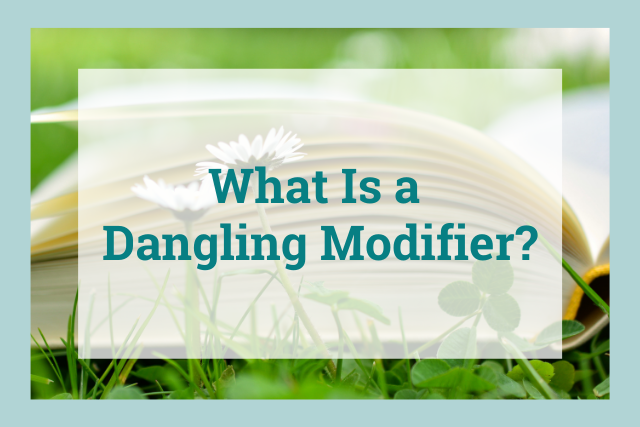
There are many common grammatical mistakes that can make your writing look less professional. One of the most common mistakes is called a dangling modifier.
So what is a dangling modifier? The short answer is that a dangling modifier is a word or clause that’s attached to the incorrect subject.
It’s important to learn how to identify and fix dangling modifiers if you want your writing to be clear and effective.
This article will explain what a dangling modifier is and how you can find and correct them in your own writing.
What Is a Dangling Modifier?
A modifier is a word, phrase, or clause that gives us more information about a subject.

A dangling modifier occurs when the subject the modifier is supposed to describe is not the subject of the sentence. Instead, the modifier is incorrectly attached to a different person or thing.
Dangling modifiers change the meaning of the sentence in an unintended way. This will make your readers either laugh or scratch their heads, neither of which is your intended outcome.
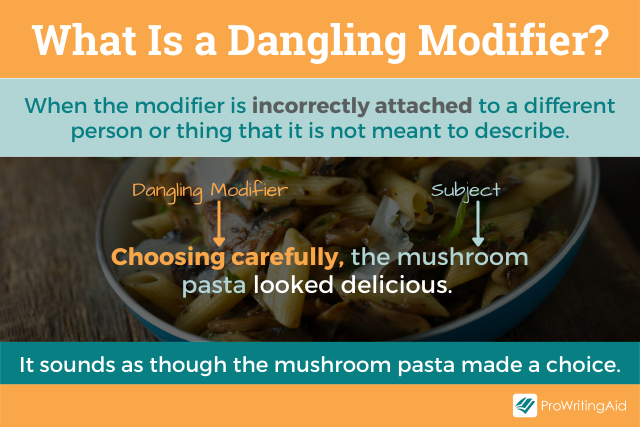
For example, take the following sentence: “Chewing slowly, the pepperoni pizza tasted delicious.”
Here, “the pepperoni pizza” is the subject of the sentence, and “chewing slowly” is a dangling modifier. It should attach to the person who’s eating the pizza, but instead, it attaches to the pizza itself, making it sound like the pepperoni pizza is the one doing the chewing.
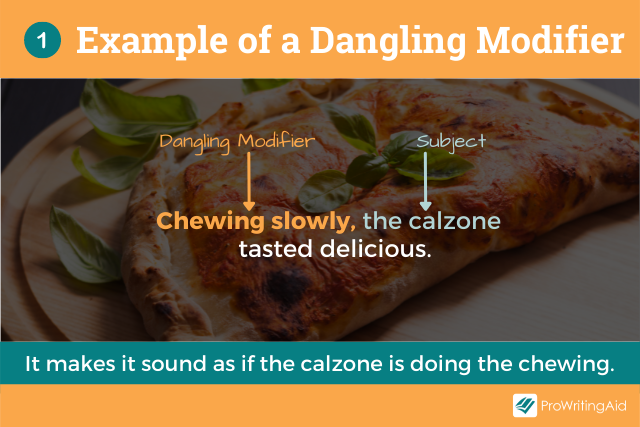
You can rewrite the sentence to include the correct subject, for example: “As I chewed slowly, the pepperoni pizza tasted delicious” or “Chewing slowly, I thought the pepperoni pizza tasted delicious.”
In both of these cases, “I” is the subject of this sentence, so the modifier is no longer dangling.
What Are Examples of Dangling Modifiers that Change the Intended Meaning of the Sentence?
Let’s look at some examples of dangling modifiers.
Example: Candy and Trick-or-Treaters
- Dressed up in various costumes, candy is collected by thousands of trick-or-treaters every Halloween.
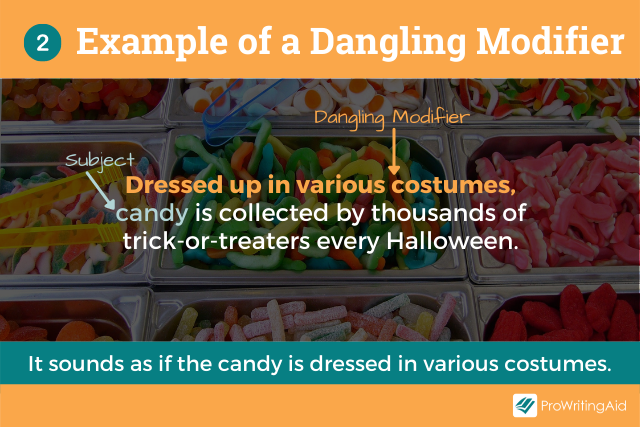
Here, the subject is “candy” and the modifier is “dressed up in various costumes.”
This sentence makes it sound like the candy is dressed up in various costumes, which would be fun to see, but isn’t what the author intends to convey.
Correct version:
- Dressed up in various costumes, thousands of trick-or-treaters collect candy every Halloween.
Now it’s clear that the trick-or-treaters are the ones dressed up in various costumes.
Example: Fathers and Toddlers
- Kicking and screaming, the exasperated father dragged his toddler out of the grocery store.
Here, the subject is “the exasperated father” and the dangling modifier is “kicking and screaming.”
This sentence makes it sound like the exasperated father is kicking and screaming while he drags his toddler away.
Correct version:
- Kicking and screaming, the toddler was dragged out of the grocery store by his exasperated father.
This revised sentence makes it clear that it’s the toddler doing the kicking and screaming.
Example: Authors and Research
- Various topics related to the American South, while writing the historical fiction novel, were researched by the author.
Here, the subject is “various topics related to the American South” and the modifier is “while writing her historical fiction novel.”
This sentence makes it sound like various topics related to the American South are writing the historical fiction novel. That would make the author’s job easier, but alas, she probably still has to write the novel herself.
Correct version:
- The author, while writing the historical fiction novel, conducted research on various topics related to the American South.
Now it’s clear that the author is the person writing the historical fiction novel.
Example: Knights and Days
- Locked alone in a tall tower, the day would come when a handsome knight would rescue her.
Here, the subject is “the day” and the modifier is “locked alone in a tall tower.”
This sentence makes it sound like the day is locked in a tower. That’s an interesting thought experiment, but it doesn’t really make sense.
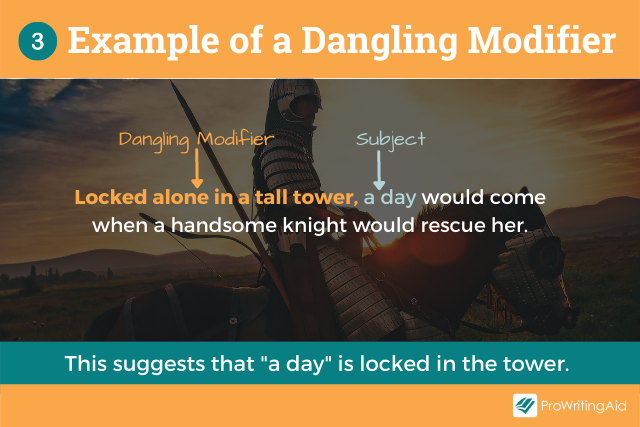
Correct version:
- Locked alone in a tall tower, the princess knew the day would come when a handsome knight would rescue her.
Now it’s clear that the princess is the one locked in the tower.
Example: Lawyers and Bars
- To succeed as a lawyer, the bar examination must be passed with flying colors.
Here, the subject is “a bar examination” and the modifier is “to succeed as a lawyer.”
This sentence makes it sound like a bar examination wants to be a lawyer.
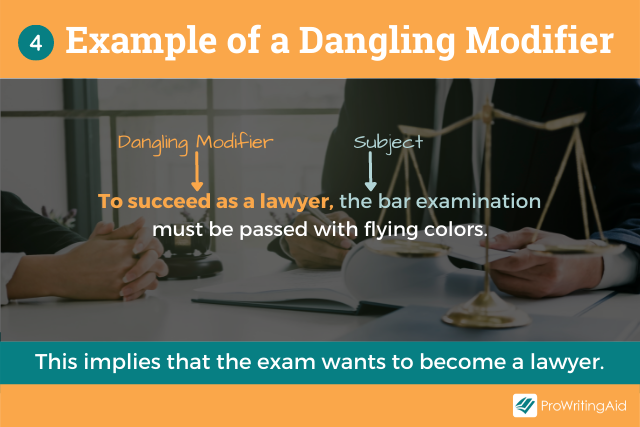
Correct version:
- To succeed as a lawyer, you must pass the bar examination with flying colors.
Now it’s clear that a person is the one who wants to succeed as a lawyer.
How Do You Find Dangling Modifiers?
To figure out if your modifier is dangling or not, you need to identify the subject of the sentence and make sure that the modifier is truly supposed to describe that specific subject.
We have a few tips for how to do this.
Look for What Comes After the First Comma
Dangling modifiers often occur when the modifier is the introductory phrase of the sentence. When the modifier is the first clause, the subject it attaches to should come immediately after the comma.
Here’s a sentence with a dangling modifier in the introductory phrase:
- While taking the bus home, a moose was seen on the side of the road.
In this case, the subject is “a moose,” and the modifier tells us that the moose took the bus home. Huh?
Here’s that same sentence with a grammatically correct modifier in the introductory phrase:
- While taking the bus home, Amy saw a moose on the side of the road.
In this case, the subject is “Amy,” and the modifier tells us that Amy took the bus home.
If the subject immediately after the comma isn’t the one the modifier should describe, chances are you have a dangling modifier on your hands.
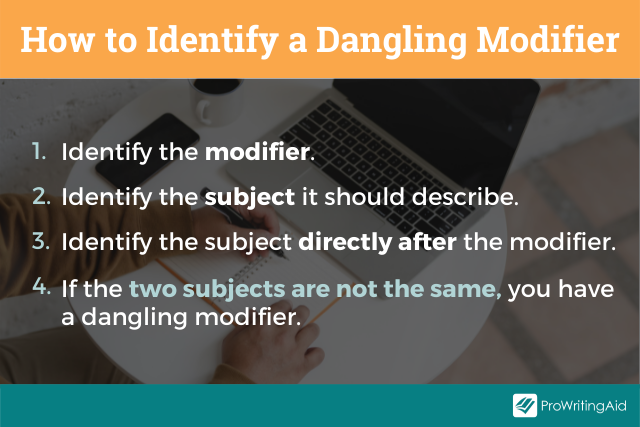
Look for Passive Voice in the Sentence
Dangling modifiers often occur in sentences that use passive voice, because passive voice turns the object into the subject.
Passive voice is when the main verb is some form of “to be,” such as “was” or “am.” Not every sentence in passive voice has a dangling modifier, but it’s sometimes a risky case.
Here are some examples of dangling modifiers written with passive voice:
- Having practiced for weeks, it was easy to win the tennis game.
- Crying for hours at a time, it was clear that she was unhappy.
- Delightfully witty and entertaining, I am having a lot of fun at this comedy show.
Need help identifying your passive voice sentences? ProWritingAid highlights passive verbs and sentences in your document, so all you have to do is check for the dangling modifier.

It'll also suggest re-writing passive verbs in the active voice, which will fix your dangling modifier by introducing the correct subject.
Check your writing for passive voice now with a free ProWritingAid account.
How Do You Fix Dangling Modifiers?
So you’ve written a sentence with a dangling modifier. What do you do now?
There’s no need to fear—it’s easy to fix dangling modifiers.
There are two ways to do it. You can either keep the modifier the way it is and rewrite the main clause of the sentence, or you can keep the main clause the way it is and rewrite the modifier.
Let’s take a look at how to use each of these methods.
Rewrite the Main Clause
The first method of fixing a dangling modifier is to keep the same modifier, but change the main sentence so that it has the right subject.
For example, say you have the sentence:
- Shrugging shyly, a nervous giggle escaped her mouth.
You can keep “shrugging shyly” if you revise the main sentence to contain the proper subject:
- Shrugging shyly, the girl giggled nervously.
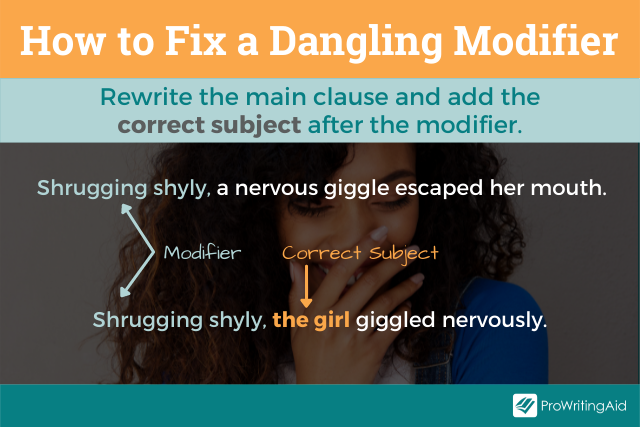
Here are some more examples of dangling modifiers that are fixed by rewriting the main clause:
- Chewing slowly, the pepperoni pizza tasted delicious. → Chewing slowly, I thought the pepperoni pizza tasted delicious.
- While taking the bus home, a moose was seen on the side of the road. → While taking the bus home, Amy saw a moose on the side of the road.
- Having practiced for weeks, it was easy to win the tennis game. → Having practiced for weeks, I found it easy to win the tennis game.
- Crying for hours at a time, it was clear that she was unhappy. → Crying for hours at a time, she was clearly unhappy.
- Delightfully witty and entertaining, I am having a lot of fun at this comedy show. → Delightfully witty and entertaining, this comedy show is a lot of fun.
Rewrite the Modifier
The second method of fixing a dangling modifier is to rewrite the modifier so that it includes the subject within it.
Then it stops being a modifier and just becomes a dependent clause.
Once again, you have the sentence:
- Shrugging shyly, a nervous giggle escaped her mouth.
This time, you can keep “a nervous giggle escaped her mouth” if you revise the modifier to contain the proper subject:
- The girl shrugged shyly as a nervous giggle escaped her mouth.
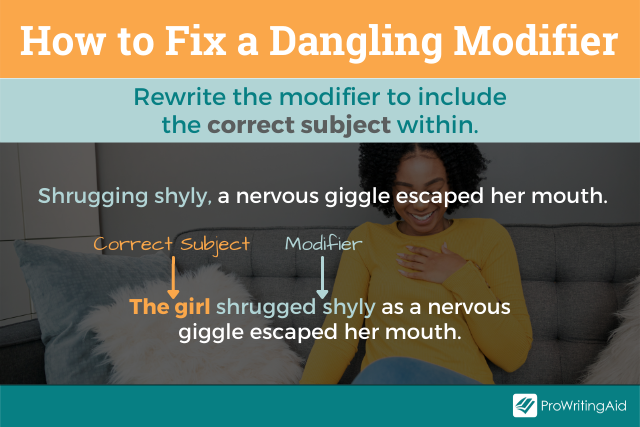
Here are some more examples of dangling modifiers that are fixed by rewriting the modifier:
- Chewing slowly, the pepperoni pizza tasted delicious. → As I chewed slowly, the pepperoni pizza tasted delicious.
- While taking the bus home, a moose was seen on the side of the road. → While Amy was taking the bus home, a moose was seen on the side of the road.
- Having practiced for weeks, it was easy to win the tennis game. → Because I had practiced for weeks, it was easy to win the tennis game.
- Crying for hours at a time, it was clear that she was unhappy. → Since she’d been crying for hours at a time, it was clear that she was unhappy.
- Delightfully witty and entertaining, I am having a lot of fun at this comedy show. → Because this comedy show is delightfully witty and entertaining, I am having a lot of fun here.